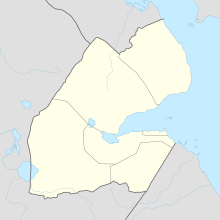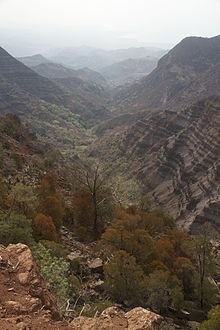Forêt du Day
Coordinates: 11 ° 45 ′ 0 ″ N , 42 ° 41 ′ 0 ″ E
The Forêt du Day (Day Forest) is the only forest in Djibouti . It is located in the Goda Mountains in the Tadjoura region and extends over about 15 km² at an altitude of 1200 to 1750 m. In 1939 it was declared a national park, but this status is no longer valid. The government of Djibouti plans to put the forest back under formal protection.
Along with the Mabla Mountains, it is the last area in which the critically endangered juniper francolin or Djibouti francolin lives, and it is also one of the few forests with East African juniper ( Juniper procera ), which was once the dominant tree species in the forest. The stocks of the Frankolin have decreased significantly, however, and 50% of the juniper trees have died since around 1990, even in the healthiest areas. Instead, box trees ( Buxus hildebrantii ) have become more common. The antelopes, which used to be numerous, have become much rarer, and desert warthogs have completely disappeared. Leopards have not been sighted since the 1980s. The most important cause is the change in the climate in the region towards more heat and drought, aggravated by the grazing of parts of the forest by cattle, who in particular eat and trample young plants. Hunting and cutting down trees, however, play a subordinate role.
The inhabitants of the nine surrounding villages belong to five different Afar clans . They were originally nomads, but today they are mostly sedentary. Their livelihood, cattle breeding, is heavily dependent on the fluctuating rainfall. In times of severe drought, they move their animals to the border with Ethiopia . All villages receive food aid . Their water supply has been ensured by wells with pumps since 2003, but the amount of water is limited. They use deadwood as firewood, while traditionally forbidding living trees to be felled. Unemployment in the area is around 80%.
According to surveys, the majority of residents of Forêt du Day consider the conservation of juniper francolin to be important, as this bird was originally a food source and is considered part of the forest's natural heritage. The majority consider drought to be the most important cause of forest damage, only 4% attribute this to grazing. At the initiative of the local organization Djibouti Nature , residents have protected parts of the forest with stone walls and barriers made of dead wood against cattle, which has a visibly positive effect on the condition of the forest. Almost a quarter of the residents believe that nothing can be done about the damage to the forest, 15% are unsure about this. 23% consider it helpful to fence in additional forest areas, 8% suggest planting trees and 29% a combination of tree planting and fencing. The establishment of a tree nursery in the village of Day is planned.
swell
- Zomo Sikander Yusuf Fisher, Center of Environmental Policy: The decline of the Djibouti francolin and juniper woodland in the Forêt du Day, Djibouti: A response to climate changes and grazing pressure? , 2007 [1] (English, PDF)
- ↑ a b Djibouti Francolin - BirdLife Species Factsheet (on protection status and tree nursery)

